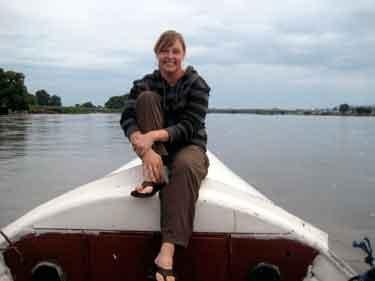
Social Citizenship in a Neoliberal Era
by Jennifer Erickson, PhD candidate, Department of Anthropology
Reprinted from the 2009 CSWS Annual Review (p. 18)
Scholars show that welfare policies affect women and men differently due to gender-based relationships with the state, which involve, for example, expectations about child rearing and shifting expectations regarding paid labor. Welfare policies negatively affect many refugee and immigrant groups in the United States by pushing them into the lowest paid sector of the economy. As a cultural project, neoliberal agendas have broadly succeeded in shaping public opinion toward an increased reliance on individual merit, consumerism, volunteerism, and distrust of government. I’ve focused my research on refugee populations in Fargo, North Dakota. In Fargo, mainstream culture highly values church attendance and spirituality, volunteering, and hard work. Although refugee clients differ widely in terms of educational and skill level, gender, religion, race, ethnicity, war-related experiences, and history with social services and the state, they are often viewed as similar in the culturally and racially homogenous Fargo.
What happens when white, ethnically Muslim refugees from a once-strong paternalist, socialist state like Bosnia-Herzegovina come to the United States, where economic self-sufficiency is the ultimate goal? How do Black, Christian Southern Sudanese—many of whom had little experience with running water, electricity, cold weather, or bureaucratic government—fare in Fargo? In Bosnia-Herzegovina and Sudan, extended kin networks play a key role in the distribution of resources and child care. In the United States, families are often forced to work different employment shifts, and to rely on nuclear families, friends, the state, and/or private agencies to compensate for the loss or changing roles of extended family. All adult refugees, regardless of gender, are encouraged to obtain jobs, but what happens when men are traditionally viewed as the breadwinner?
My project answers these questions and explains why some groups of refugees are more culturally equipped to succeed in some arenas than others, and hence have more social capital and better relationships with service providers. Bosnian Roma (Gypsies), for example, are categorized as some of the least-worthy citizens in Fargo as compared with other refugees. Roma comprised about 10 percent of the population in prewar Bosnia, but in Fargo are at least half of some 3,000 Bosnians. My research shows that Roma are overrepresented in the welfare sector in Fargo, and generally speaking, they have poor relationships with social services, educational systems, and the wider community. I examine historical, economic, and cultural reasons why Roma are deemed unworthy citizens and compare these with factors affecting non-Romani Bosnian Muslims and Southern Sudanese.
Ultimately, my dissertation aims to show that a comparative methodology combined with an understanding of political economy, culture, and identity can help us better understand citizenship, belonging, and the kinds of racialized, gendered, and class hierarchies that form and become solidified in everyday practices in institutions. I will also provide recommendations on how to decrease the negative impacts of these hierarchies and better serve refugee clients.

